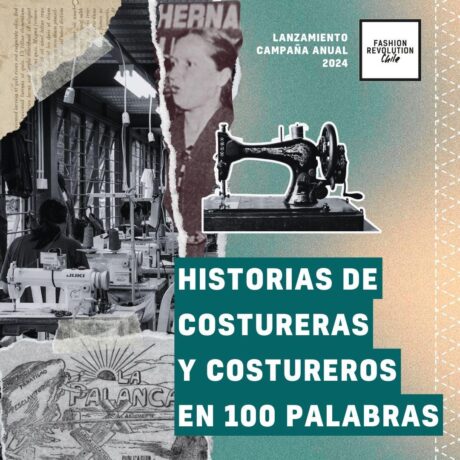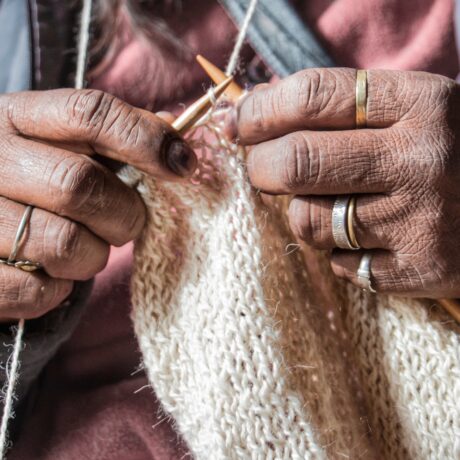Who Made the Cotton for your Clothes?
Cotton made in Africa (CmiA) supports the Fashion Revolution in order to encourage people to start asking ‘Who makes the cotton for my clothes?’. CmiA-labelled cotton stands for social and ecological responsablly produced cotton in Sub-Saharan Africa. By purchasing the CmiA-labelled clothes every consumer makes a valuable contribution to improving the living conditions of African cotton farmers and their families as well as Africa’s long-term future. For CmiA and its partners women are an essential key to sustainable development within its program.
 Nelifa Miti from Zambia is one of the 85,000 CmiA female cotton farmers and member of a cotton women’s club. In an interview, Nelifa allows us to gain an insight into her work, the women club and her life:
Nelifa Miti from Zambia is one of the 85,000 CmiA female cotton farmers and member of a cotton women’s club. In an interview, Nelifa allows us to gain an insight into her work, the women club and her life:
“My name is Nelifa. I am a female cotton farmer from Zambia and member of our local Cotton Women Club – the Chatata Women Club. The club is very important to me because I have acquired a lot of knowledge in cotton production and other crops like maize from the training we receive. We learn best farming practices that place a good emphasis on new methods to save our water and soil. What we practically learn at the Club field we do our best to replicate on our individual fields and this has really been beneficial to us. A lot has changed for me since I entered the club. The level of income has increased and this has reduced poverty at my home. Another point which is just as important is that through this I have learnt to easily interact with other women in my community, especially with a number of our club members who not necessarily come from my village but from those close to ours. This is also very important to me, ” introduces Nelifa Miti herself.
“I am the head of disciplinary department in the club. My friends respect me, not only for this but also for my age. As one of the oldest members of our club and Chair of the disciplinary department, I am looked at as a source of wisdom and guidance. We give each other guidance as women on how best we can succeed in our community, in our farming as well as everyday life. Additionally, we give each other support to work hard and sustain our families. I want to see women be creative and enterprising in our communities, so that they do not struggle to survive. I am a widow, but I am able to manage my home and have been able to take care of my family on my own. Being part of this is because of my membership in the club. Our club is encouraging more women to start cotton growing in our community, especially those who thought that they cannot manage as women. But now they are attracted by what we are doing and they have seen that we now even own a business in our group. This has really inspired a lot of women. Our club helps us to stand on our own two feet, both within the community as well as in the cotton production,” explains Nelifa further.
 Besides the women clubs, CmiA supoorts a range of other activities to empower women in the cotton growing areas. These include adapting training in sustainable cotton production to the needs of female participants and training female cotton farmers to become lead farmers in order to strengthen their role within the training groups. Employees of the cotton companies receive training in gender equality and women’s representatives are established as a regular contact person in the company. In addition, the female farmers involved receive easier access to loans and their own contracts with the cotton companies to earn their income independantly. Currently, 36 women’s cooperatives each with at least 25 members in Ivory Coast benefit from a financial start-up as part of a joint project.
Besides the women clubs, CmiA supoorts a range of other activities to empower women in the cotton growing areas. These include adapting training in sustainable cotton production to the needs of female participants and training female cotton farmers to become lead farmers in order to strengthen their role within the training groups. Employees of the cotton companies receive training in gender equality and women’s representatives are established as a regular contact person in the company. In addition, the female farmers involved receive easier access to loans and their own contracts with the cotton companies to earn their income independantly. Currently, 36 women’s cooperatives each with at least 25 members in Ivory Coast benefit from a financial start-up as part of a joint project.
About Cotton made in Africa
Cotton made in Africa (CmiA) is an initiative of the Aid by Trade Foundation (AbTF) that provides assistance in helping people help themselves through trade, improving the living conditions of cotton farmers and their families in Sub-Saharan Africa. Approximately 435,000 smallholder farmers and including their family members more than 3,2 million people from Zambia, Zimbabwe, Mozambique, Malawi, Ghana, and Côte d’Ivoire currently participate in the CmiA program. Through training programs, Cotton made in Africa teaches the cotton farmers about modern, efficient, and environmentally friendly cultivation methods that help them improve the quality of their cotton, yield higher crops, and thus earn a better income. The initiative’s approach focuses on activating market forces instead of aid. An alliance of international textile companies built up by CmiA buys the sustainably grown cotton and pays a license fee to the foundation. The license fees paid by the demand partners are directly reinvested to benefit smallholder farmers in the project countries Currently more than 20 textile companies are part of the demand alliance, including Puma, C&A, Tom Tailor, s. Oliver, the Rewe Group, Tchibo, Engelbert Strauss or the Otto Group. www.cottonmadeinafrica.org
All Photo credits P. Hahn for AbTF except Photo of Nelifa by C. Hansen for AbTF








